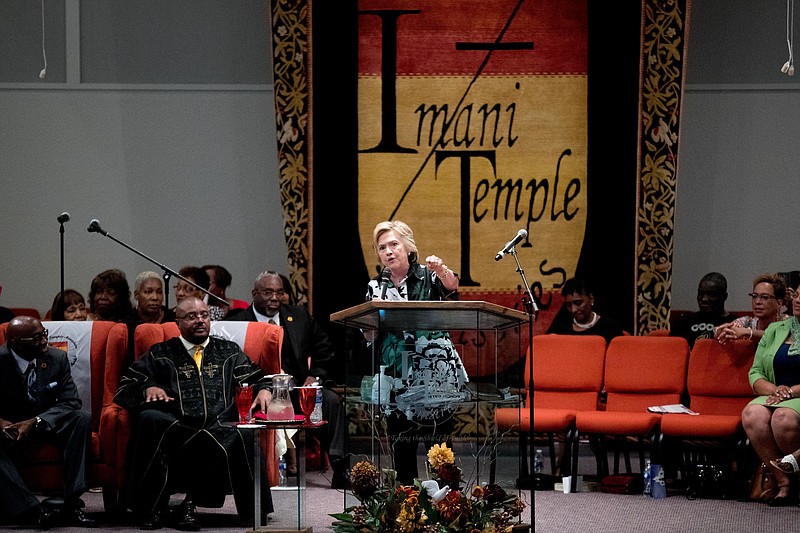Grace-less
If you personally hate one particular legal semi-automatic rifle, you won't be getting any of the $26 fried chicken with prunes and shallots at Anne Verrill's Grace restaurant in Portland, Maine.
"If you own this gun," she wrote on Facebook of an AR-15 rifle, which she mistakenly believed was the gun used to kill 49 people in a June terrorist attack in Orlando, Fla., "or you condone the ownership of this gun for private use, you may no longer enter either of my restaurants, because the only thing I want to teach my children is love."
Maine is an open-carry state, but Verrill has a right to make decisions about whether to allow guns on her property. But the thought-police aspect of her comment may be a little over the top.
The restaurateur got a lot of blowback about her post, took it down, then spoke to The New York Times about it. She told The Times she wished she had worded her original post differently because her comment about patrons condoning the use of the gun was a distraction, but she rejected any comparison to a baker who doesn't want to bake a cake for a gay couple because it violated the baker's religious beliefs.
"Gun owners are not a protected class," Verrill said. "Owning a gun is a choice. It bears literally no resemblance to the biological nature of the color of your skin or your sexual orientation."
Perhaps unknown to her, nothing less than the Constitution protects owners of legal guns, the opinions they give and the thoughts they have. But who has time for the Constitution when you're wallowing in intolerance?
Seeking the truth
Books don't necessarily translate into votes, but the top three New York Times hardcover nonfiction best-sellers last week were anti-Hillary Clinton books.
No. 1, topping the list for four straight weeks, was "Crisis of Character" by former Secret Service agent Gary J. Byrne, who, in being posted directly outside President Bill Clinton's Oval Office, describes what he observed of Hillary Clinton's character and the culture inside the White House.
No. 2 was "Hillary's America" by Dinesh D'Souza, which warns that four or eight years under the former secretary of state would so utterly transform America as to make it unrecognizable.
No. 3 was "Armageddon" by Dick Morris and his wife, Eileen McGann, which portrays a possible White House under Clinton that would further flout constitutional government and replace it with an all-powerful president backed by an activist judiciary that answers to no one. A former adviser to the Clintons, Morris also provides a game plan to take back the White House and the country from those he says would destroy it.
As a bit of cherry on top of the sundae, No. 6 on the paperback nonfiction list was "Clinton Cash," the former hardcover best-seller that details donations made to the Clinton Foundation by foreign entities.
Life in Obama's America
In Seattle recently, black U.S. Congress candidate Jesse Wineberry was pulled over by police for driving a minivan that had been reported stolen. But the Democrat, instead of apologizing for not turning in his rented vehicle at the end of the rental contract (triggering the report to police), accused the police of racially profiling him and told them his white opponent must have put them up to it.
Wineberry, who initially tried to drive away from officers, ignored their commands, called a black officer an "Uncle Tom" and generally was - according to police - "uncooperative," later blamed the car not being turned in on an "error" by one of his campaign staffers. Once the problem was worked out, Wineberry was properly released, but he immediately filed a complaint against the Seattle Police Department, accusing the officers of racism.
This, of course, is the same candidate who said his opponent, incumbent Rep. Adam Smith, couldn't represent the largely minority district because he is white.
How-to guide
The ever helpful federal government is at it again.
A policy guide on the Customs and Border Patrol website instructs anyone in the country illegally where he can go and how they can be unobtrusive while avoiding anyone who may have in mind upholding the laws that were passed to stop those here illegally from being here in the first place. Got it?
The guide refers to "sensitive locations" such as schools, school bus stops, hospitals and religious ceremonies where those breaking the law are unlikely to find trouble.
"Public demonstrations" are also referenced, meaning illegal immigrants who want to protest the laws and people who would uphold illegal immigration laws are pretty safe doing so. Sanctuary cities are also safe ground for them to be "free" to live their lives "without fear or hesitation," they're told.
If that's not helpful enough, the information also is translated into Spanish (but no other foreign languages), and a toll-free number and email address are available for illegal immigrants to report enforcement efforts occurring at any of the "sensitive locations."
"This administration has systematically and maliciously attacked and deconstructed all phases of border enforcement," Dan Stein, president of the watchdog group Federation for American Immigration Reform, told Fox News. "Agents are in a state of despair. They are being turned into nursemaids, chaperones and bus drivers."
